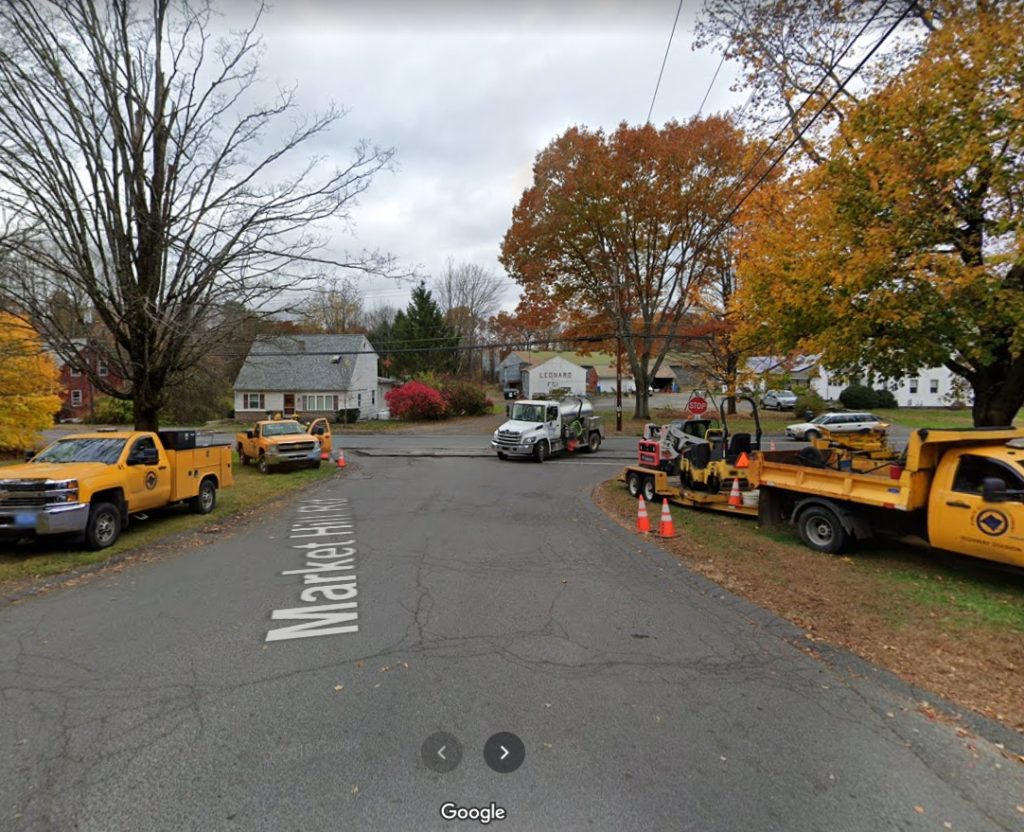Committee Weighs Potholes vs. Building Projects

Intersection of Market Hill Road and Henry Street in Amherst. Photo: Google Maps
The plan to finance four major building projects in the next six years will impact the number of miles of road that can be paved each year, according to comments made by Public Works Superintendent Guilford Mooring and Finance Director Sean Mangano to the Joint Capital Planning Committee (JCPC) on March 3rd. (See this Indy article for the impact on operating budgets and staffing.)
Mooring presented his department’s requests for capital funding for the next fiscal year, which included $850,000 of Town funds for road repairs to supplement a similar amount from the state. Mooring reported to the committee that the backlog in road repairs is estimated at $20-$22 million. Another survey is planned this year to get an updated list of road repair needs and a cost estimate. The priority road project list has not been made public although Mooring said he will share it with the JCPC shortly.
School Committee member Peter Demling who, along with Kerry Spitzer, represents the schools on the JCPC, asked Mooring if the roads would still be safe to drive on if the Town’s figure were to be reduced from, say, $850,000 to $700,000. Mooring responded that it would reduce the length of roads that could be paved and would likely mean more potholes and de-laminations. For context, he shared that the repaving of Henry Street from Market Hill Road to the s-curves at North East Street (about one mile) cost $852,000.
The Town’s budgeting strategy over the past few years, according to Mangano, has been to allocate more for roads in an effort to tackle the repair backlog before debt repayments begin for the major building projects, placing other demands on capital funds.
At-large Town Councilor Andy Steinberg mused about the dilemma facing the Town in this regard, noting that cutting back on the ongoing road maintenance program is a “really difficult decision” as he recognizes that the state of the roads is an important measure for residents of quality public service. In addition, Steinberg expressed concern about the potential for insurance claims against the town and the wear and tear on heavier town vehicles due to poor road conditions. Steinberg, who is also Chair of the Finance Committee, has indicated support for the current plan for funding the four major capital projects.
Demling, too, expressed concern about balancing the major capital projects, other capital needs (like roads), and department operating budgets. “For operating budgets, the pain point is already there,” he said. “For some people, quality of life is impacted by the number of potholes, but for some others, quality of life is impacted by what we are doing to the operating budget.”

I don’t know what the answer is, but as someone who bikes a lot on our roads both for recreation and transportation, I think it’s important to recognize that potholes on many of our roads are a pretty serious danger (i.e. more than a quality of life issue) for cyclists. There are many holes large enough to crash a bike if the rider doesn’t see (or can’t avoid) them, and sometimes avoiding them means swerving out into car traffic. Bridge St. just north of Pine St. is a great (?) example of this.
Nice work Toni Cunningham, you are so right. Or at least, my concept of the “Amherst Problem”. My concern is a general one. We’ve put off major projects long enough that now we have four, well, make that five major projects to try getting done. These should have been assessed a long time ago and dealt with then, not tabled! Now there’s a real mess when adding the infrastructure needs of Amherst. I really get upset when the big money projects start getting scheduled, and the projects that have been stalled are just left there, unscheduled and not commercially of interest to those businessmen who like action and big returns. There’s so much to do in Amherst, that needs doing, and in my mind, none of it is taking on big money projects that tear-down existing buildings to construct high-end apartments without enough parking.
I’ll stop here because I’m starting to rant, but there’s a lot wrong that needs fixing here. If we had town meeting, the old setup when things took a lot of time and people like me used to work with town government until we found the answers, and then took the time to fix them. Then, on to the next thing, and took the time and opinions of the residents. Ask residents if they have any power in Amherst and they’ll tell you that they don’t. Town Meeting took too long and was large and opinionated. But things got done! Today, I personally feel, that the “big money guys” have the inside tract to getting their projects approved. They are well received by Town Council, and are progressing toward what’s good for their interests, and not for Amherst residents.
So go right ahead with the projects that line your pockets and forget about Amherst infrastructure.
And, don’t even support the concept and movement to get Amherst declared a “city”. It’s a town, not a city!